Wintering With Awe
Author: Rachel Hunsell
As romantic as it sounds to feel an early autumn breeze blow through an open window — breathing in the signs of change it carries, I merely opened the window to rid my kitchen of the burnt-toast smoke plumes. I’ll prepare you a delectable four-course meal, but it’s risky to ask me to monitor the broiler.
Once that cool breeze grazed my forehead, though, I felt compelled to open another window. Once our home began to swirl with autumn air, I sat down at our dining table for breakfast with my toddler, forever admiring her curiosity and content state. Through a mix of babbles and clear-as-day phrases, she pointed out our large bay window facing the south, beams of sunlight pouring in, and noticed the birds, our dogs, and the caravan of tractors, trailers, and combines driving by preparing to harvest. We giggled at the dog playing, explored the variety of ways you can eat eggs, and found every opportunity to share in the miracle of being alive, together.
This brief moment of daily routine relaxed my shoulders, brought warmth to my chest, and welled my eyes; I was in awe.
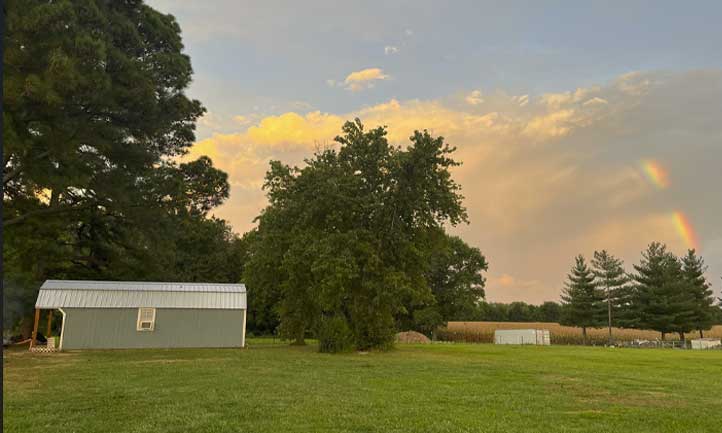
This sensation of everyday wonder, awe, is defined by Dacher Keltner, professor of psychology at the University of California, Berkeley, co-director of UC Berkeley’s Greater Good Science Center, and renowned expert in the science of human emotion, as “the feeling of being in the presence of something vast that transcends your current understanding of the world.”
Enamored by my 20-month-old, I sipped my coffee and allowed myself this moment of surrender. I gazed out the window, over my somewhat neglected, but still alive and thriving, houseplants, and took in the view. All of my senses came online, and I began to notice our Tibetan mastiff’s tail fluff dancing across the yard, the neighbor’s trees turning yellow and fuchsia at the edges, a lawn in need of mowing, yellow butterflies seeking a gentle place to land, the warm smell and taste of my dark coffee, the signs of things to do piled on my table, the plants that need repotting and tending, the tiny, sticky hands patting me, and the musical sound of “Mama.” My home, my world; how could it be so beautifully chaotic? So pure and so messy? So tender, so jarring and, yet, so blissful too?
These moments used to come so naturally, abundantly in the before — before a long season of grief, of loss, of change, of wintering. In the what follows, I’ve wondered, where did my awe go? What happened to my light? Did the undeniable effervescence of my existence waltz out with my life’s summer breeze?
This season, not just the turning of summer into fall into winter, but this season of life is calling me to listen and to look with curiosity, with wonder. The great change of this season is like a reckoning — not just a call but a necessity to open my heart and my mind to awe — not just for inspiration, but to heal.
In his book, Awe: The New Science of Everyday Wonder and How it Can Transform Your Life, Keltner and his research colleagues synthesized awe into eight categories in what they call the “Eight Wonders of Life”: the moral beauty of others, collective movement, nature, visual design, music, spirituality, big ideas, and encountering the beginning and end of life.
Each one of these magical wonders of life can be found in the everyday moments we breeze through, detach from, and reject in our state of grief. I know, because it’s where I’ve been.
The middle of the pandemic, what felt like an oddly blissful time for me, soon would become the beginning of my long winter. Shortly after our group of TAPS survivors summited Mt. Kilimanjaro at the end of February 2020, the world went on pause, and I moved in with my, now, fiancé, over 800 miles from everything I knew. Life was a true paradise — a budding relationship, happy dogs, bright Texas sunshine, the hopeful journey toward parenthood, and endless possibilities.
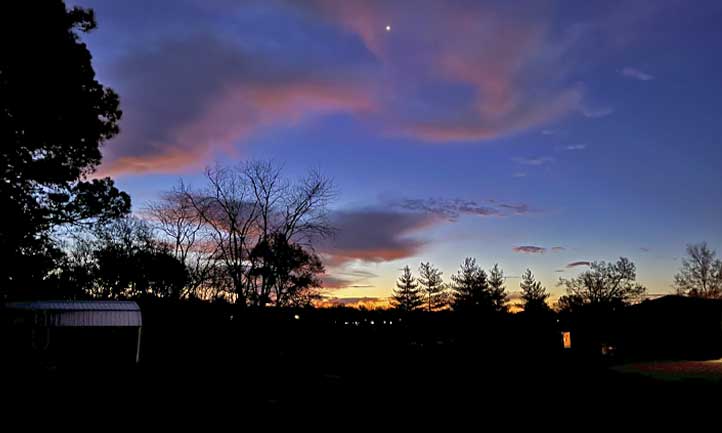
I didn’t see winter coming, and I didn’t recognize the signs of change that I knew so well. In June of 2020, I began to notice abdominal pain that seemed irregular. After eight weeks of monitoring, I was sent to a specialist — the kind that works at cancer centers. After nearly 11 months and countless tests since that initial appointment, I underwent a diagnostic surgery that removed a tennis ball-sized tumor, one of my ovaries, and a fallopian tube. Within two months of that surgery, we’d completed two rounds of in vitro fertilization (IVF), and I made my way back to the hospital for invasive ovarian cancer treatment surgery that removed my entire reproductive system.
In the middle of our IVF cycles, we lost my dear mother-in-law to COVID, and my partner crisscrossed the country almost a dozen times to say his goodbyes and move his sisters to Illinois from Arizona. My health and the pandemic left me stranded in my bedroom, like many others across the globe.
In search of connection and growth, I began a master's program in recreational therapy. There I was, in surgical menopause at the age of 30, deeply grieving and forcing myself to remain grateful that I was still alive. But, I wasa mess. I’d slipped into a different state of being.
There are “gaps in the mesh of the everyday world,” says Katherine May in Wintering: The Power of Rest and Retreat in Difficult Times, “and sometimes they open up and you fall through them into somewhere else. Somewhere else runs at a different pace to the here and now, where everyone else carries on. Somewhere else is where ghosts live, concealed from view and only glimpsed by people in the real world. Somewhere else exists at a delay, so that you can’t quite keep pace. I fell through, as simply and as discreetly as dust shifts through the floorboards. I was surprised to find that I felt at home there. Winter had begun.”
I didn’t know it at the time, but my long winter had arrived. Awe, an emotion that was at the core of my life values, began to decline in my life. I sunk into the dark parts of winter — the cold corners of grief that seem to feel easy for me.
Death, grief, pain — these are all normalities in the life of a survivor. Secondary losses, like the loss of friendships, parts of ourselves, dreams, and so on, can jolt us, then make us question the real emotions that come with them. I thought countless times how silly it was of me to feel so depressed when I’m still alive and I’ve only lost my health, my time, my sanity, my [insert your loss here].
But, this place that I both loathed and knew so comfortably well, was dimming the light of the world in ways I also knew intimately well. Winter, you see, is but a season. Our world, both within and beyond us, exists in cycles. And, it wasn’t until very recently that I opened my heart to the lessons of this winter in my life and the truly healing power of awe.
Cold days of the heart were nearly always warmed by regular check-ins from my colleagues at TAPS. The work of healing is true in the halls of our workplace, for each of you and for each other. “Survivors helping survivors heal” is not simply a turn of phrase, it’s a way of life I’ve come to hold deep gratitude for.
In the midst of the chaos of diagnoses and moves and grief, the strongest survivor I know, my older sister, whispered the offering of life to my partner and me. Laying in the hospital room in recovery, my kind and gentle big sister held my hand and said, “If they tell you you can’t on your own, I want to carry a child for you.” There it was again, awe.
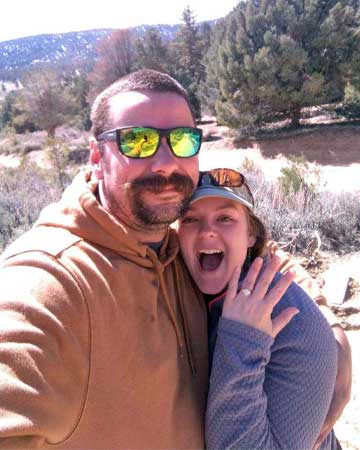
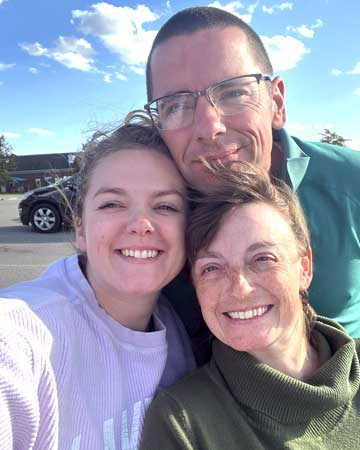
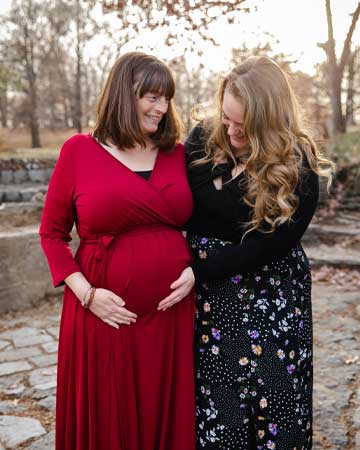
With this awe again came countless visits to the doctor, but they now included heartbeats, ultrasounds of new life, and anxious anticipation of our miracle. Every moment I spent with my partner, my sister, and my growing child, I felt such awe in the moral beauty of my sister’s selflessness, in the magnificence of science and IVF, in the bond that was growing between all four of us — even the brief moments huddled together in the women’s health center parking lot, winter wind whipping. Awe swirled around us.
On a snowy January morning, our Rae of light was born into the world, and I was enraptured in the essence of being alive. This moment would not be the end of my winter, but the glimmer of sunshine to guide me to a new spring.
Just over a year after the birth of our daughter, our family of three journeyed west on a three-week road trip to the California coast where we encountered countless vistas from our camper and car; visited my partner’s hometown and his mother, uncle, and grandparents’ graves; and made our way through the scenery of his youth. Overlooking Los Padres National Forest on a breathtaking February morning on Frazier Mountain, I turned to find him down on one knee with a world of possibilities between us. There it was again, awe.
Healing is an active choice, a lesson this wintering has taught me, yet again. And, awe has become my greatest medicine.
Awe, this emotion that transcends our understanding of the world, puts life into perspective. Activating the vagus nerve, awe brings on a sense of calm and quiets the Default Mode Network, or the stream of self-focused thoughts, allowing us to expand our sense of wonder and meaning. In turn, awe reduces inflammation and activates the release of oxytocin. These healing properties target some of the greatest challenges for grievers like us.
While I’ve found awe in these profound moments, like our engagement and the birth of our daughter, awe lives in the everyday moments at the dining table with my family, tending to my garden, shopping at the grocery store, in the morning shuffle of my Spotify playlists, and sharing an evening of jokes with my fiance on our back porch after our toddlers’ night-night routine.
As this wintering has come and will soon go, I’m becoming more and more attuned to awe in my life. I’m scheduling it into my daily routine, getting outside at least three times a day, listening to my favorite music with my daughter, exploring life’s greatest curiosities with my fiance, and being intentional about the seeds of joy and gratitude I’m sowing, both literally and figuratively, for soon spring will arrive.
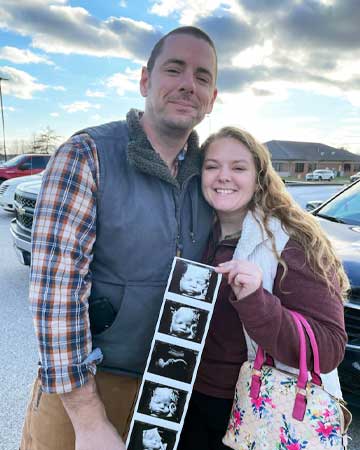
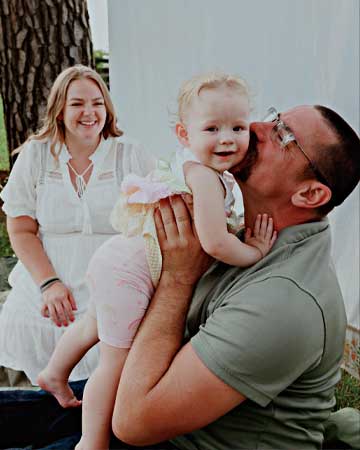
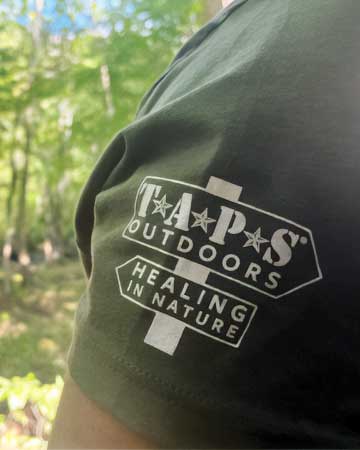
Finding Awe in Nature
Awe awaits you in some of our nation’s most beautiful landscapes. Experience moments of connection and wonder alongside fellow military and veteran survivors through events hosted by TAPS Outdoor Programs. Check our events calendar often; new opportunities are added throughout the year. We look forward to sharing incredible moments with you.
Rachel Hunsell is the TAPS Outdoor Programs Manager, overseeing the development, implementation, and support of outdoor programming across the organization. As the surviving sibling of Marine LCpl J. Kyle Price, she knows the valleys and peaks of the grief journey, and she is passionate about connecting survivors to the healing power of nature as part of their grief process.
Photos: Rachel Hunsell
